2018届高三英语话题阅读话题《健康》学案含答案
- 格式:doc
- 大小:55.50 KB
- 文档页数:8
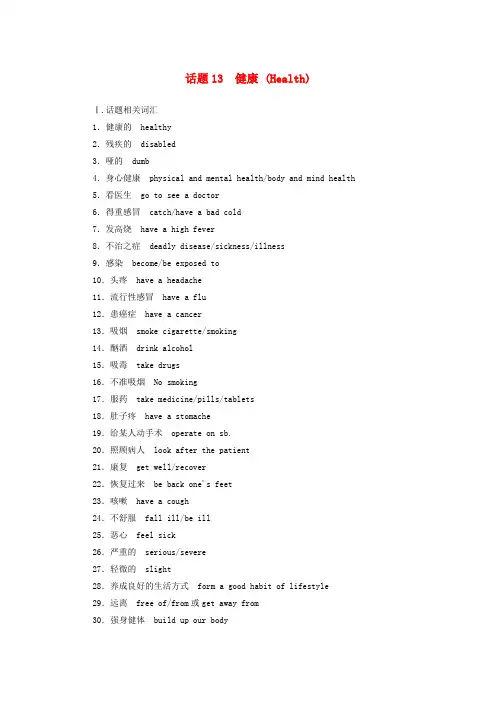
话题13 健康 (Health)Ⅰ.话题相关词汇1.健康的healthy2.残疾的disabled3.哑的dumb4.身心健康physical and mental health/body and mind health 5.看医生go to see a doctor6.得重感冒catch/have a bad cold7.发高烧have a high fever8.不治之症deadly disease/sickness/illness9.感染become/be exposed to10.头疼have a headache11.流行性感冒have a flu12.患癌症have a cancer13.吸烟smoke cigarette/smoking14.酗酒drink alcohol15.吸毒take drugs16.不准吸烟No smoking17.服药take medicine/pills/tablets18.肚子疼have a stomache19.给某人动手术operate on sb.20.照顾病人look after the patient21.康复get well/recover22.恢复过来be back one's feet23.咳嗽have a cough24.不舒服fall ill/be ill25.恶心feel sick26.严重的serious/severe27.轻微的slight28.养成良好的生活方式form a good habit of lifestyle 29.远离free of/from或get away from30.强身健体build up our body31.抵制疾病fight against disease32.保持健康keep healthy33.保持乐观keep optimistic34.瞎的;视而不见的blind35.癌cancer36.聋的;听不进的deaf37.医治treat38.诊所;门诊部clinic39.治疗;医好cure40.牙科医生dentistⅡ.实用句型1.外科医生给病人做了手术。
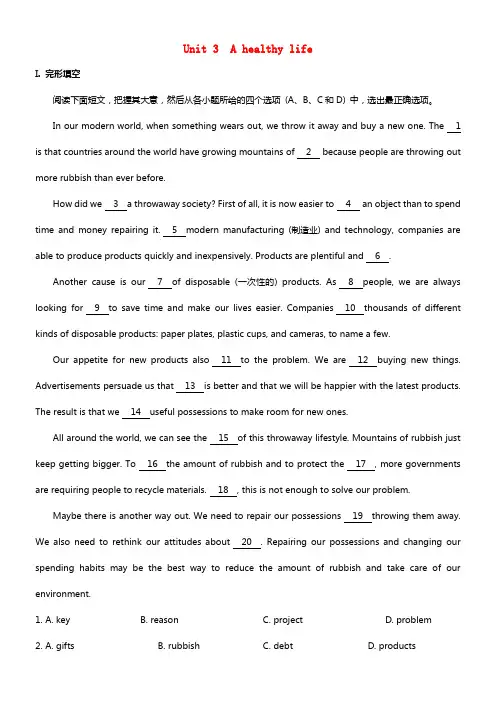
Unit 3 A healthy lifeI. 完形填空阅读下面短文,把握其大意,然后从各小题所给的四个选项(A、B、C和D) 中,选出最正确选项。
1. A. key B. reason C. project D. problem2. A. gifts B. rubbish C. debt D. products3. A. face B. become C. observe D. change4. A. hide B. control C. replace D. withdraw5. A. Thanks to B. As to C. Except for D. Regardless of6. A. safe B. funny C. cheap D. powerful7. A. love B. lack C. prevention D. division8. A. sensitive B. kind C. brave D. busy9. A. ways B. places C. jobs D. friends10. A. donate B. receive C. produce D. preserve11. A. adapts B. returns C. responds D. contributes12. A. tired of B. addicted to C. worried about D. ashamed of13. A. newer B. stronger C. higher D. larger14. A. pick up B. pay for C. hold onto D. throw away15. A. advantages B. purposes C. functions D. consequences16. A. show B. record C. decrease D. measure17. A. technology B. environment C. consumers D. brands18. A. However B. Otherwise C. Therefore D. Meanwhile19. A. by B. in favour of C. after D. instead of20. A. spending B. collecting C. repairing D. advertising II. 阅读明白得APre-school children who spend time together take on one another’s personalities, new research had found. The study reveals that environment plays a key role I shaping people’s personalities.While genetics still forms the core of the human psyche(心灵), the research finds that personality traits are “contagious” among children.“Our finding that personality traits are “contagious” among children flies a face of common assumptions that personality is ingrained(根生蒂固的) and can’t be changed,” said Dr Jennifer Neal, associate professor of psychology at Michigan State University and co-author of the study. “This is important because some personality traits can help children succeed in life, while others can hold them back.”The researchers studied the personalities and social networks of two pre-school classed for a full school year. One of the classes was a set of three-year-olds, and one a set of four-year-olds. Children whose friends were hard-working or outgoing gradually took on these personality traits over time. But children whose peers were anxious or easily frustrated did not take on these traits.The new study is not the first to explore the contagious effects of personality traits.A 2021 psychology study found that rudeness at work can be contagious as it travels from person to person “like a disease”. Researchers form Sweden’s Lund University claimed that even petty (微乎其微的) behavior, like not inviting someone to a communal event or spreading rumors, can start the cycle off. The study found that seeing a supervisor being rude to an employee was enough to cause people to be rude to those around them. Often, those who experienced rudeness would be rude to others.Dr Eva Torkelson, a psychologist at Lund University, said the most common cause of people acting rudely at work was imitating others.“An important finding form our study is that those who behave rudely in the work place experience stronger social support, which probably makes them less afraid of negative reactions to their behavior form managers and colleagues.”Dr Torkelson believes companies need to be more aware of the harm that rudeness in the workplace can do, as it can grow and damage the atmosphere in the office.1. What does the underlined word “contagious” mean in the second paragraph?A. Faulty.B. Influential.C. Harmful.D. Troublesome2. From the fourth paragraph, we can learn that .A. children whose friends are hard-working can succeed more easilyB. children whose peers are easily frustrated can fail more easilyC. children of three years old have personalities that are more activeD. children of four years old have personalities that are less active3. The 2021 psychology study indicates that .A. rudeness at work should be banned totallyB. rudeness at work is beneficial occasionallyC. supervisors and employees can be influenced by the rudeness at workD. rudeness at work like “a disease” cannot be changed4. What can we conclude from Dr Eva Torkelson?A. People who behave rudely will not gain support at work.B. Bad behavior can be imitated in the workplace,C. Managers will be more friendly to their employees in the future.D. Rudeness can be a motivation for most employees.BMany kids help out around the house with chores(家庭杂务) such as emptying the dishwasher, putting laundry away, and taking out the trash. In exchange, some kids get allowances(补助) or other rewards such as extra computer time.But some people do not think that kids should get rewards for doing chores. Susie Walton, a parenting educator and family coach, believes that by rewarding kids, parents are sending a message that work isn’t worth doing unless you ge t something in return. "Running any kind of household is a team effort," Susie said. “A home is a living space for everyone in the family. It’s important for kids to see that we all have responsibilities in the house, and that families decide together how they want their home to look, and how they are going to keep it looking like everyone wants it to look.”Other people believe that getting a cash allowance or other rewards motivates kids to do chores, and it also teaches them real world lessons about how we need to work to earn money. There are also new applications that give kids points and digital gifts that can be redeemed(兑取) either online or in the real world. With the ChoreMonster app, kids earn digital points by completing chores that they can turn in for real-life rewards such as extra Xbox time or a trip to the mall. “Our goal is to encourage kids to earn rewards,” says Chris Bergman, founder of ChoreMonster. “Kids need positive reinforcement(强化) to help motivate them.”zx&xkWhat do you think? Should kids be rewarded for doing chores? Or should kids help out around their homes without getting anything in return?5. How does the author start the passage?A. By presenting some facts.B. By listing some evidence.C. By comparing different views.D. By stating his own experiences.6. According to Susie Walton, _______.A. kids should be rewarded for doing choresB. parents decide what kids can do for the familyC. kids have the responsibility to share houseworkD. kids can get extra computer time for doing chores7. What is Paragraph 3 mainly about?A. The advantages of rewarding kids for doing chores.B. Chris Bergman’s opinion on raising kids.C. Main reasons why kids need encouragement.D. How to motivate kids to try new applications.8. What’s the author’s attitude toward rewarding kids for doing chores?A. Supportive.B. Opposed.C. Critical.D. Neutral.Ⅲ. 七选五型阅读明白得How to Communicate with a Deaf PersonCommunicating with a deaf person doesn’t have to be as difficult as it might seem. The trick is to be patient, straightforward, and to remember that deaf people communicate visually. Before you know it, you’ll forget you were ever worried!Method 1: Starting Your Conversation1 You can do this by moving into the person’s field of vision and waving from a polite distance, or by tapping the person gently on the shoulder. If it’s a real emergency, you can also turn the lights off and on quickly.Position yourself carefully. Make sure that the light in the room is shining directly onto your face, and that you’re not standing with your back to a light. 2Find out how the person prefers to communicate. Some deaf people are better lip-readers than others. Some deaf people may prefer to write back and forth or to use an interpreter. Many interactions between the deaf and the hearing require a combination of these methods. 3Method 2: Communicating through Lip-readingKeep your sentences simple and use plain language. 4 The more complex your phrasing and vocabulary, the more likely your deaf companion is to miss something. Try to avoid using slang or expressions that are n’t widely known.When someone else is speaking, don’t turn away from the deaf person in yo ur group. 5 You don’t have to look at the deaf person while someone else is talking, but try to make sure your face is visible.A. Get the person’s attention.B. I t’s important not talk too quickly.C. Or, t hey’ll miss parts of the conversation.D. If so, it’ll make them feel left out of the conversation.E. Stand directly in front of the person, at a normal distance.F. The best way to know which methods are most effective is to ask.G. Try not to be too difficult when using your words in the beginning.Ⅳ. 短文改错假定英语课上教师要求同桌之间互换修改作文,请你修改你同桌写的以下作文。
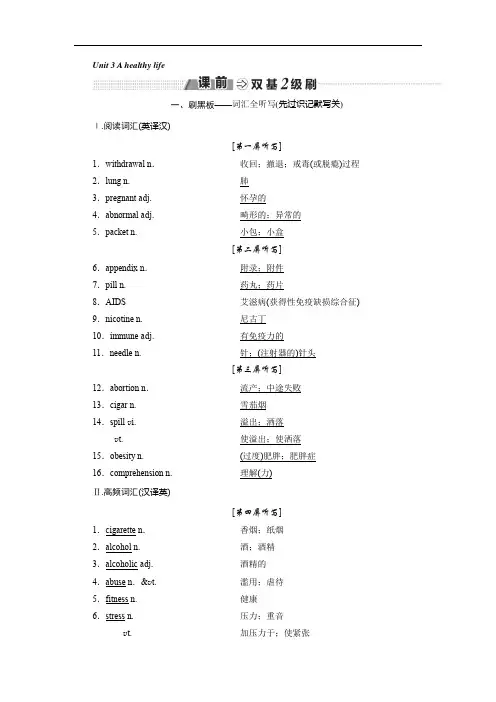
Unit 3 A healthy life一、刷黑板——词汇全听写(先过识记默写关)Ⅰ.阅读词汇(英译汉)[第一屏听写]1.withdrawal n.收回;撤退;戒毒(或脱瘾)过程2.lung n. 肺3.pregnant adj.怀孕的4.abnormal adj.畸形的;异常的5.packet n. 小包;小盒[第二屏听写]6.appendix n.附录;附件7.pill n. 药丸;药片8.AIDS 艾滋病(获得性免疫缺损综合征) 9.nicotine n. 尼古丁10.immune adj.有免疫力的11.needle n. 针;(注射器的)针头[第三屏听写]12.abortion n.流产;中途失败13.cigar n. 雪茄烟14.spill v i.溢出;洒落v t.使溢出;使洒落15.obesity n. (过度)肥胖;肥胖症16.comprehension n. 理解(力)Ⅱ.高频词汇(汉译英)[第四屏听写]1.cigarette n.香烟;纸烟2.alcohol n. 酒;酒精3.alcoholic adj.酒精的4.abuse n.&v t.滥用;虐待5.fitness n. 健康6.stress n. 压力;重音v t.加压力于;使紧张[第五屏听写]7.stressful adj.产生压力的;紧张的8.adolescent n. 青少年adj.青春期的9.adolescence n. 青春期10.ban v t.禁止;取缔n. 禁令;谴责11.due adj.欠款的;预定的;到期的[第六屏听写]12.tough adj.困难的;强硬的13.addicted adj.入了迷的;上了瘾的14.accustom v t.使习惯于15.accustomed adj.惯常的;习惯了的16.automatic adj.无意识的;自动的17.automatically ad v. 无意识地;自动地[第七屏听写]18.mental adj.精神的;智力的19.mentally ad v. 精神上;智力上20.quit v t.停止(做某事);离开21.effect n. 结果;效力22.bad-tempered adj.脾气暴躁的;易怒的23.breathless adj.气喘吁吁的;屏息的24.unfit adj.不健康的;不合适的;不合格的25.strengthen v t.加强;巩固;使坚强v i.变强[第八屏听写]26.relaxation n.放松;松弛27.desperate adj.绝望的;拼命的28.chemist n. 药剂师;化学家29.disappointed adj.失望的;沮丧的30.weaken v i.(对某事的决心)动摇;减弱v t.(使)变弱31.ashamed adj.感到惭愧或羞耻的[第九屏听写]32.illegal adj.不合法的;违法的33.robbery n. 抢劫;盗窃34.slippery adj.滑的35.survival n. 幸存36.sex n. 性;性别37.male adj.男性的;雄性的n. 男人;雄性动(植)物[第十屏听写]38.female adj.女性的;雌性的n. 雌性的动(植)物;女人39.prejudice n. 偏见;成见40.judgement n. 看法;判决;判断41.embarrassed adj.尴尬的;陷入困境的42.awkward adj.局促不安的;笨拙的43.decide_on 对……作出决定44.feel_like_(doing) 想要(做)……[第十一屏听写]45.in_spite_of不顾;不管46.take_risks_(a_risk) 冒险47.get_into 陷入;染上(坏习惯) 48.at_risk 处境危险;遭受危险49.due_to 由于……50.addicted_to 对……有瘾51.accustomed_to 习惯于……二、刷清单——热身自盘点(再过基本应用关) (一)核心单词(二)常用短语一、过重点单词——纵引横联超人一点1.stress n .重压;逼迫;压力;重音;强调重要性 v t.加压力于;使紧张;重读 [高考佳句] One of the most effective ways to reduce stress is to talk about feelings with someone you trust.(2015·浙江高考单选)减少压力最有效的方式之一就是与你信任的人聊聊感受。
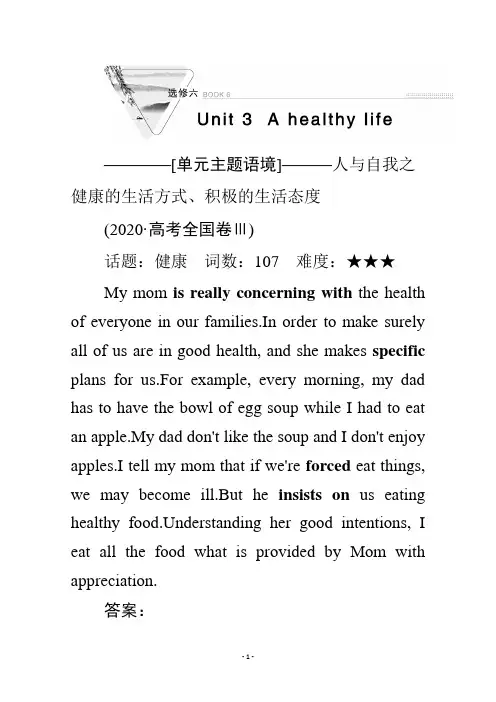
————[单元主题语境]———人与自我之健康的生活方式、积极的生活态度(2020·高考全国卷Ⅲ)话题:健康词数:107难度:★★★My mom is really concerning with the health of everyone in our families.In order to make surely all of us are in good health, and she makes specific plans for us.For example, every morning, my dad has to have the bowl of egg soup while I had to eat an apple.My dad don't like the soup and I don't enjoy apples.I tell my mom that if we're forced eat things, we may become ill.But he insists on us eating healthy food.Understanding her good intentions, I eat all the food what is provided by Mom with appreciation.答案:My mom is really concerning with the health of everyone in our familiesfamily.In order to makesurelysureall of us are in good health,and she makes specific plans for us.For example, everymorning, my dad has to have theabowl of egg soupwhile I hadhave to eat an apple.My dad don'tdoesn'tlikethe soup and I don't enjoy apples.I tell my mom that if we're forced ∧toeat things, we may becomeill.But hesheinsists on us eating healthy food.Understanding her good intentions, I eat all thefood whatthatis provided by Mom with appreciation.一、语言能力熟词生义/ 词类活用1.be concerned with 关心,关怀2.specific adj.明确的;具体的3.force v.强迫,迫使(某人做某事)4.insist on 坚持二、思维品质短文改错技巧——巧辩what与that在定语从句的考查中,出现频率较高的是that引导的定语从句。
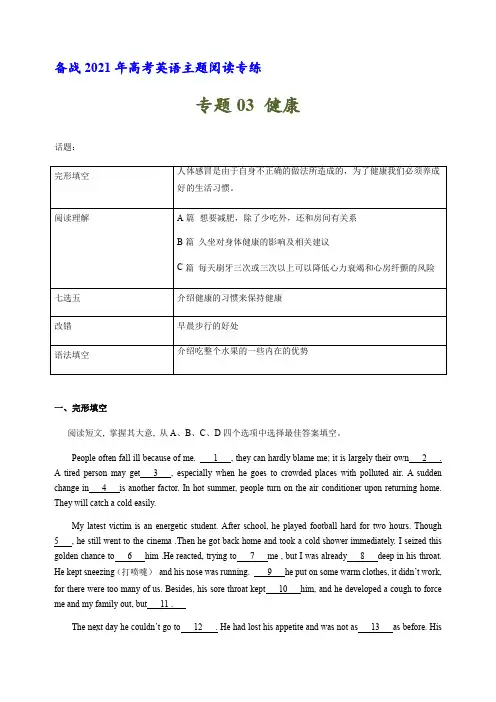
备战2021年高考英语主题阅读专练专题03 健康话题:一、完形填空阅读短文, 掌握其大意, 从A、B、C、D四个选项中选择最佳答案填空。
People often fall ill because of me. 1 , they can hardly blame me; it is largely their own 2 .A tired person may get 3 , especially when he goes to crowded places with polluted air. A sudden change in 4 is another factor. In hot summer, people turn on the air-conditioner upon returning home. They will catch a cold easily.My latest victim is an energetic student. After school, he played football hard for two hours. Though 5 , he still went to the cinema .Then he got back home and took a cold shower immediately. I seized this golden chance to 6 him .He reacted, trying to 7 me , but I was already 8 deep in his throat. He kept sneezing(打喷嚏)and his nose was running. 9 he put on some warm clothes, it didn’t work, for there were too many of us. Besides, his sore throat kept 10 him, and he developed a cough to force me and my family out, but 11 .The next day he couldn’t go to 12 . He had lost his appetite and was not as 13 as before. Hismother made him orange juice every few hours for more vitamin C, which would help his 14 . For two days he was 15 by his mother. As he rested more, his defense strengthened and I began to feel the 16 I knew I had to 17 him before long. But I am not the one who gives up easily, and I made every effort to fight back 18 , it was my turn to feel 19 now, for his defense system was starting an all-out attack against me. I became 20 and finally my time was over.Do you know what I am?1.A.Therefore B.Besides C.However D.Then2.A.business B.responsibility C.excuse D.fault3.A.punished B.blamed C.caught D.killed4.A.temperature B.season C.place D.condition5.A.excited B.hurt C.late D.tired6.A.injure B.bother C.attack D.destroy7.A.get on with B.get rid of C.put up with D.take hold of 8.A.reproducing B.waiting C.hiding D.disappearing9.A.Since B.Once C.Whether D.Although 10.A.reminding B.upsetting C.comforting D.influencing 11.A.escaped B.succeeded C.regretted D.failed12.A.bed B.work C.school D.hospital13.A.peaceful B.afraid C.active D.happy14.A.recovery B.development C.study D.affected15.A.protected B.nursed C.scolded D.affected16.A.loss B.operation C.pressure D.movement17.A.leave B.catch C.forget D.beat18.A.Uncertainly B.Unfairly C.Unusually D.Unfortunately 19.A.painful B.tired C.nervous D.ashamed20.A.bigger B.weaker C.smaller D.stronger【答案】1.C2. D3. C4. A5. D6. C7. B8. A9. D 10. B11.D 12. C 13. C 14. A 15. B 16. C 17. A 18. D 19. A 20. B【解析】本文使用了拟人的手法,从第一人称“我”的角度讲述了人体感冒的起因以及发病过程等。
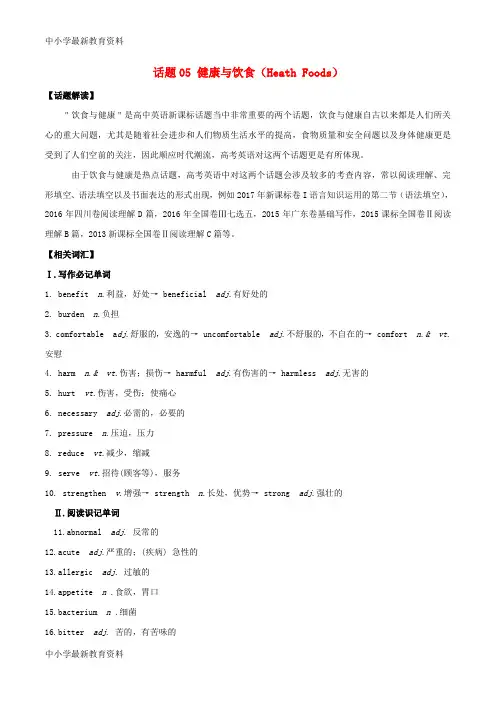
话题05 健康与饮食(Heath Foods)【话题解读】"饮食与健康"是高中英语新课标话题当中非常重要的两个话题,饮食与健康自古以来都是人们所关心的重大问题,尤其是随着社会进步和人们物质生活水平的提高,食物质量和安全问题以及身体健康更是受到了人们空前的关注,因此顺应时代潮流,高考英语对这两个话题更是有所体现。
由于饮食与健康是热点话题,高考英语中对这两个话题会涉及较多的考查内容,常以阅读理解、完形填空、语法填空以及书面表达的形式出现,例如2017年新课标卷I语言知识运用的第二节(语法填空),2016年四川卷阅读理解D篇,2016年全国卷Ⅲ七选五,2015年广东卷基础写作,2015课标全国卷Ⅱ阅读理解B篇,2013新课标全国卷Ⅱ阅读理解C篇等。
【相关词汇】Ⅰ.写作必记单词1. benefit n.利益,好处→ beneficial adj.有好处的2. burden n.负担3. comfortable a dj.舒服的,安逸的→ uncomfortable adj.不舒服的,不自在的→ comfort n.& vt.安慰4. harm n.& vt.伤害;损伤→ harmful adj.有伤害的→ harmless adj.无害的5. hurt vt.伤害,受伤;使痛心6. necessary adj.必需的,必要的7. pressure n.压迫,压力8. reduce vt.减少,缩减9. serve vt.招待(顾客等),服务10. strengthen v.增强→ strength n.长处,优势→ strong adj.强壮的Ⅱ.阅读识记单词11.abnormal adj.反常的12.acute adj.严重的;(疾病) 急性的13.allergic adj. 过敏的14.appetite n .食欲,胃口15.bacterium n .细菌16.bitter adj. 苦的,有苦味的17.bleed vi.出血,流血18.depression n .抑郁症→ depress vt.使沮丧,使意志消沉,使心灰意冷→ depressed adj.抑郁的,沮丧的19.digest vt. 消化;领会One question I’m frequently asked is "Wha t’s the secret to a healthy diet?" The answer isn’t all that mysterious. You just have to keep some basic guidelines in mind, beginning with:经常有人问我:"健康饮食有什么秘诀?"其实答案并不神秘。
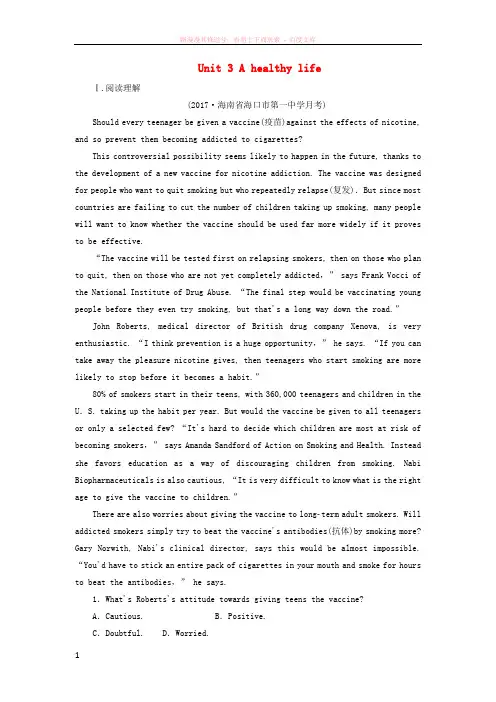
Unit 3 A healthy lifeⅠ.阅读理解(2017·海南省海口市第一中学月考)Should every teenager be given a vaccine(疫苗)against the effects of nicotine, and so prevent them becoming addicted to cigarettes?This controversial possibility seems likely to happen in the future, thanks to the development of a new vaccine for nicotine addiction. The vaccine was designed for people who want to quit smoking but who repeatedly relapse(复发).But since most countries are failing to cut the number of children taking up smoking, many people will want to know whether the vaccine should be used far more widely if it proves to be effective.“The vaccine will be tested first on relapsing smokers, then on those who plan to quit, then on those who are not yet completely addicted,” says Frank Vocci of the National Institute of Drug Abuse. “The final step would be vaccinating young people before they even try smoking, but that's a long way down the road.”John Roberts, medical director of British drug company Xenova, is very enthusiastic. “I think prevention is a huge opportunity,” he says. “If you can take away the pleasure nicotine gives, then teenagers who start smoking are more likely to stop before it becomes a habit.”80% of smokers start in their teens, with 360,000 teenagers and children in the U.S. taking up the habit per year. But would the vaccine be given to all teenagers or only a selected few? “It's hard to decide which children are most at risk of becoming smokers,” says Amanda Sandford of Action on Smoking and Health. Instead she favors education as a way of discouraging children from smoking. Nabi Biopharmaceuticals is also cautious, “It is very difficult to know what is the right age to give the vaccine to children.”There are also worries about giving the vaccine to longterm adult smokers. W ill addicted smokers simply try to beat the vaccine's antibodies(抗体)by smoking more? Gary Norwith, Nabi's clinical director, says this would be almost impossible. “You'd have to stick an entire pack of cigarettes in your mouth and smoke for hours to beat the antibodies,” he says.1.What's Roberts's attitude towards giving teens the vaccine?A.Cautious. B.Positive.C.Doubtful. D.Worried.2.What may Sanford agree with?A.Older children have the right to decide.B.Children are most at risk of becoming smokers.C.Every child should be given the vaccine.D.It's important to educate children on the danger of smoking.3.Norwith's words in the last paragraph suggest that ________.A.the vaccine is effective in helping addicted smokersB.it is hard for child ren to become longterm smokersC.longterm adult smokers smoke for hours every dayD.he is worried about the vaccine's longterm effects4.Which of the following would be the best title for the text?A.Strong effects of nicotine.B.Stop them before they start.C.More teenagers become addicted.D.Protect teenage nicotine addiction.答案与解析每个青少年都应该注射尼古丁疫苗来阻止他们吸烟上瘾吗?本文围绕这一问题展开了讨论。
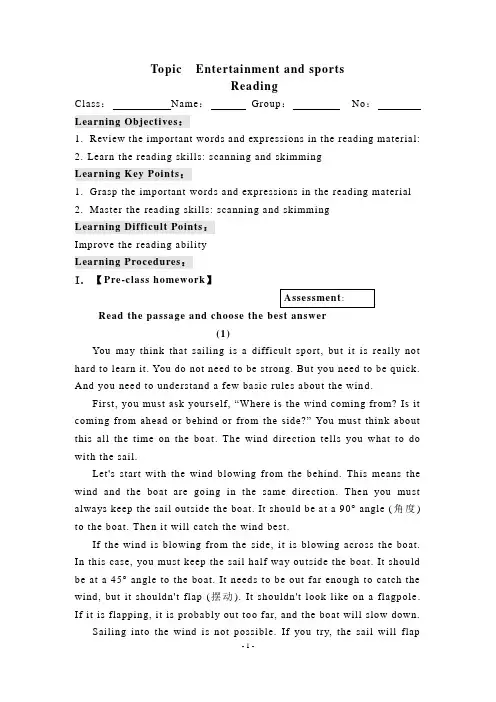
Topic Entertainment and sportsReadingClass:Name:Group:No:Learning Objectives:1.Review the important words and expressions in the reading material:2. Learn the reading skills: scanning and skimmingLearning Key Points:1.Grasp the important words and expressions in the reading material2.Master the reading skills: scanning and skimmingLearning Difficult Points:Improve the reading abilityLearning Procedures:I.【Pre-class homework】Read the passage and choose the best answer(1)You may think that sailing is a difficult sport, but it is really not hard to learn it. You do not need to be strong. But you need to be quick. And you need to understand a few basic rules about the win d.First, you must ask yourself, “Where is the wind coming from? Is it coming from ahead or behind or from the side?” You must think about this all the time on the boat. The wind direction tells you what to do with the sail.Let's start with the wind blowing from the behind. This means the wind and the boat are going in the same direction. Then you must always keep the sail outside the boat. It should be at a 90° angle (角度) to the boat. Then it will catch the wind best.If the wind is blowing from the side, it is blowing across the boat. In this case, you must keep the sail half way outside the boat. It should be at a 45° angle to the boat. It needs to be out far enough to catch the wind, but it shouldn't flap (摆动). It shouldn't look like on a flagpole. If it is flapping, it is probably out too far, and the boat will slow down.Sailing into the wind is not possible. If you try, the sail will flap- 1 -and the boat will stop. You may want to go in that direction. It is possible, but you can't go in a straight line. You must go first in one direction and then in another. This is called tacking. When you are tacking, you must always keep the sail inside the boat.(NMET 2012全国2)1. What should you consider first while sailing?A. Sailors' strength.B. Wave levels.C. Wind directions.D. Size of sails.2. What does the word “It” underlined in Paragraph 4 refer to?A. The boat.B. The wind.C. The sail.D. The angle.3. What do you have to do when sailing a gainst the wind?A. Move in a straight line.B. Allow the sail to flap.C. Lower the sail.D. Tack the boat.4. Where can you probably find the text?A. In a popular magazine.B. In a tourist guidebook.C. In a physics textbook.D. In an official report.(2)Does Fame Drive You Crazy?Although being famous might sound like a dream come true, today’s star, feeling like zoo animals, face pressures that few of us can imagine. They are at the cente r of much of the world’s attention. Paparazzi (狗仔队) camp outside their homes, cameras ready. Tabloids (小报) publish thrilling stories about their personal lives. Just imagine not being able to do anything without being photographed or interrupted for a signature.According to psychologist Christina Villareal, celebrities —famous people —worry constantly about their public appearance. Eventually, they start to lose track of who they really are, seeing themselves the way their fans imagine them, not as the p eople they were before everyone knew their names. “Over time,” Villareal says, “they feel separated and alone.”The phenomenon of tracking celebrities has been around for ages. In the 4th century B.C., painters followed Alexander the Great intobattle, hoping to picture his victories for his admirers. When Charles Dickens visited America in the 19th century, his sold-out readings attracted thousands of fans, leading him to complain (抱怨) about his lack of privacy. Tabloids of the 1920s and 1930s ran articles about film-stars in much the same way that modern tabloids and websites do.Being a public figure today, however, is a lot more difficult than it used to be. Superstars cannot move about without worrying about photographers with modern cameras. When they say something silly or do something ridiculous, there is always the Internet to spread the news in minutes and keep their “story” alive forever.If fame is so troublesome, why aren’t all celebrities running away from it? The answer is there are still ways to deal with it. Some stars stay calm by surrounding themselves with trusted friends and family or by escaping to remote places away from big cities. They focus not on how famous they are but on what they love to do or whatever made them famous in the first place.Sometimes a few celebrities can get a little justice. Still, even stars who enjoy full justice often complain about how hard their lives are. They are tired of being famous already. (NMET2013北京)5. It can be learned from the passage that stars today___________.A. are often misunderstood by the publicB. can no longer have their privacy protectedC. spend too much on their public appearanceD. care little about how they have come int o fame6. What is the main idea of Paragraph 3?A. Great heroes of the past were generally admired.B. The problem faced by celebrities has a long history.C. Well-known actors are usually targets of tabloids.D. Works of popular writers often have a lot o f readers.7. What makes it much harder to be a celebrity today?A. Availability of modern media.B. Inadequate social recognition.C. Lack of favorable chances.- 3 -D. Huge population of fans.8. What is the author’s attitude toward modern celebrity?A. Sincere.B. Sceptical.C. Disapproving.D. Sympathetic.II.【While-class】Step1. Lead-inStep2. Group discussion and presentationStep3.Consolidation: Read the following passage and choose the best answer(1)Group exercise is one of the most effective ways to improve physical fitness and sustain a healthy lifestyle.Group exercise is challenging, yet fun and empowering! Of course everyone knows that exercise is good for the body.However, studies have shown that when exercise is performed in groups, it's not only great for improving physical health but for psychological health. It's an opportunity to be social, release endorphins, and improve your strength. Additionally, group exercise creates a community feel and the shared commo n goal motivates participants to work hard. The instrumental support of taking on a fitness journey with others proves more effective than going to the gym alone.Another beneficial aspect of group exercise is the informational support participants receive from the instructor. Many people fear the gym because they feel lost and don't want to embarrass themselves. If you feel you can relate, then group training is an even better option for you. It's a great opportunity to learn more about fitness through the clear instruction and supervision of a fitness instructor. If you're tired of wandering around the gym wasting time and becoming bored, !you can attend an upbeat group fitness class that'll keep your workout on track. Don't letfitness frighten you!If you're serious about wanting to live a healthy lifestyle, it's extremely important to surround yourself with people who'll provide you with the proper emotional support. I wouldn't scold anyone for deciding to party on weekends and in turn I wouldn't expect anyone to give offence to me for focusing on my health. Surround yourself with people who uplift, encourage and understand you! Make fitness even more fun by trying something new or any group fitness class, with a friend. Plan to go for a jog together. The n try a fun healthy restaurant or fresh juice bar! Fitness can be both fun and social!Surrounding yourself with people who'll provide you with respect support can be very beneficial while working towards reaching healthand fitness goals. First, decide to do it for yourself and work towards staying positive. Then make sure the people you surround yourself with are supportive. Don't let negativity ruin your motivation.(NMET2015福建卷E篇)9. The first paragraph focuses on.A. the greatest challenge of group exerciseB. the most effective way to improve physical fitnessC. the contribution of group exercise to psychological healthD. the shared common goal in performing exercise in groups10.The underlined word "upbeat" in the second paragraph probably means "____”A. cheerfulB. averageC. seriousD. temporal11. When it comes to emotional support, the author thinks it necessaryA. to sustain a colorful lifestyleB. to party on weekends with positive peopleC. to try a fun healthy restaurant regularlyD. to surround yourself with supportive people12. What would be the best title for the passage?A. Seeking SupportB. Supporting HealthC. Improving Your StrengthD. Building Up Fitness(2)Opera at Music Hall:1243 Elm Street. The season runs June through August,with additional performances in March and September.The Opera honors enjoy the Arts membership discounts. Phone:241-2742. .Chamber Orchestra: The Orchestra plays at Memorial Hall at 1406 Elm Street, which offers several concerts from March through June. Call 723-1182 for more information. http:.Symphony Orchestra: At Music Hall and River bend. For ticket sales, call 381-3300. Regular season runs September through May at Music Hall in summer at River bend. /home.asp.College Conservatory of Music (CCM):Performances are on the main campus(校园)of the university, usually at Patricia Cobbett Theater. CCM organizes a variety of events, including performances by the well-known Lasalle Quartet, CCM’s Philharmonic Orchestra, and various groups of musicians presenting Baroque through modern music Students with I.D card can attend the events for free. A free schedule of events for each term is available by calling the box office at- 5 -556-4183. /events/calendar.Riverbend Music Theater: 6295 Kellogg Ave. Large outdoor theater with the closest seats under cover (piece difference).Big name shows all summer long! Phone:232-6220. http:///.(NMET 2016 全国III)13. Which number should you call if you want to see opera?A. 241-2742.B. 723-1182.C. 381-3300.D. 232-6220.14. When can you go to a concert by Chamber Orchestra?A. February.B. May.C. August.D. November.15. Where can student go for free performances with their ID cards?A. Music Hall.B. Memorial Hall.C. Patricia Cobbett Theater.D. Riverbend Music Theater.16. How is Riverbend Music Theater different from the other places?A. It has seats in the open air.B. It gives shows all year round.C. It offers membership discounts.D. It presents famous musical works.Step4.PresentationStep5.SummaryIII.【Post-class】Self- reflectionKeys:Suggested Answers:I. Pre-class homework1-4 CCDA 5-8 BBADII. While-class (课堂教学流程)9-12 CADB 13-17 ABCA- 7 -。
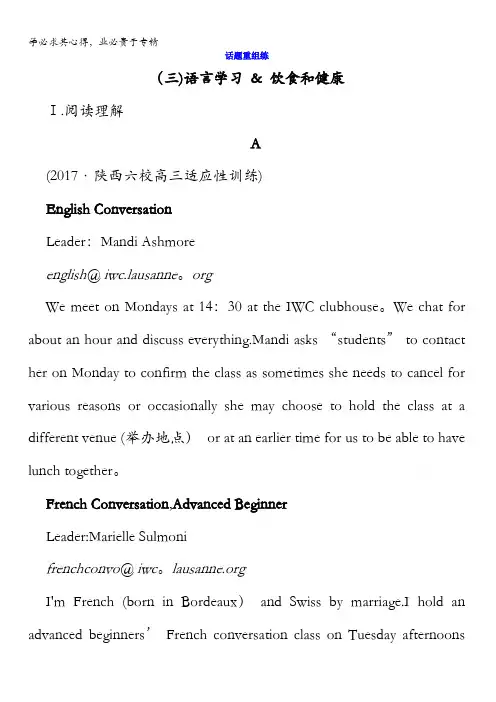
话题重组练(三)语言学习& 饮食和健康Ⅰ.阅读理解A(2017·陕西六校高三适应性训练)English ConversationLeader:Mandi Ashmoreenglish@ usanne。
orgWe meet on Mondays at 14:30 at the IWC clubhouse。
We chat for about an hour and discuss everything.Mandi asks “students” to contact her on Monday to confirm the class as sometimes she needs to cancel for various reasons or occasionally she may choose to hold the class at a different venue (举办地点)or at an earlier time for us to be able to have lunch together。
French Conversation,Advanced BeginnerLeader:Marielle Sulmonifrenchconvo@ iwc。
I'm French (born in Bordeaux)and Swiss by marriage.I hold an advanced beginners’ French conversation class on Tuesday afternoonsfrom 14:30-16:00.We meet weekly at the clubhouse in a friendly atmosphere。
I hope to help you use your knowledge of French,allowing you to speak with no fear of making mistakes,which in time will become fewer and fewer.French Language Lab,BeginnerLeader:Malja Remlingerfrenchlab@iwc。
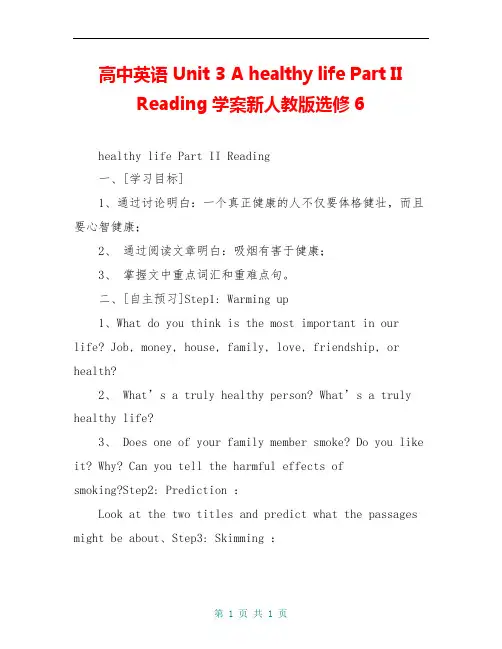
高中英语 Unit 3 A healthy life Part II Reading学案新人教版选修6healthy life Part II Reading一、[学习目标]1、通过讨论明白:一个真正健康的人不仅要体格健壮,而且要心智健康;2、通过阅读文章明白:吸烟有害于健康;3、掌握文中重点词汇和重难点句。
二、[自主预习]Step1: Warming up1、What do you think is the most important in our life? Job, money, house, family, love, friendship, or health?2、What’s a truly healthy person? What’s a truly healthy life?3、 Does one of your family member smoke? Do you like it? Why? Can you tell the harmful effects ofsmoking?Step2: Prediction :Look at the two titles and predict what the passages might be about、Step3: Skimming :Skim the letter and find the main idea of each paragraph、、( )A、Grandad talks about James’ problem of smoking、( )B、 The3 different ways of becoming addicted、( )C、Grandad’s hope for his gra ndson James and advice on stopping smoking、( )D、 The harmful effects of smoking、( )E、 Grandad tells about the life he is living and the importance of a healthy life、Step4: Careful reading、Task1、Fill in the form 、 Information from the reading passage Different ways people can become addictedto cigarettes1、become ____________ addicted to nicotine2、 become addicted through ______________3、 become ____________ addicted to nicotineHarmful physical effects for smokers1、do terrible damage to your _____________2、 difficult for smoking couples to _________3、 have the ends of the fingers turn ________Effects that a person’s smoking can have onother people1、smell ______________________________2、 affect the health of ___________________Effects that smoking can have on sporting performanceBe unable to enjoy _____________________Task2、 Fill in the blanks according to the given advice on quitting smoking、 Choose a day that is not __________ to quit smoking、 Make a list of all the __________ you will get from stopping smoking、 ___________ all your cigarettes at the end of the day before you plan toquit、 ________ the list of benefits you wrote when you feel like smoking、 Develop some other habits like walking, drinking some water, cleaning the house and so on to keep yourself busy、 If you feel nervous or stressed, try to do some __________ exercises like deep breathing、 You can stop smoking with a friend or join a group、 If you feel really bad, ask a doctor or _________ for help、 The most important thing is to keep trying、Dont feel ________ if you have to _________ several times because some people have to try many times before they finally quit smoking、 Never give up and you will succeed、Step5、 Discussion: What kind of person do you think James’ grandfather is?三、[基础知识]I、重点词组和短语(仔细阅读课文,你会发现他们的哟!)1、在…的尽头____________________________2、在我这个年龄________________________3、在两周之后___________________________4、由于___________________________5、过着健康的生活________________________6、戒烟___________________________7、在青春期______________________________8、对…上瘾;沉溺于…____________________9、习惯于…______________________________10、处于痛苦之中___________________11、由于习惯;出于习惯____________________12、反复;一次又一次_____________________13、对…了解很多_________________________14、对…有很大的损害____________________15、怀孕_________________________________16、在某种程度上________________________17、影响健康_____________________________18、闻起来有臭味________________________19、变得气喘吁吁_________________________20、被足球队除名________________________21、增强决心_____________________________22、定下一个日子________________________23、列出…_______________________________24、从…中获益__________________________25、想要做某事___________________________26、伸手去够;伸手去拿__________________27、安排做某事___________________________28、感到绝望____________________________29、感到惭愧_____________________________II、重点句子1、【教材原句】Your mother tells me that you started smoking some time ago and now you are finding it difficult to give it up、【结构归纳】句中it为_________, 真主语为。
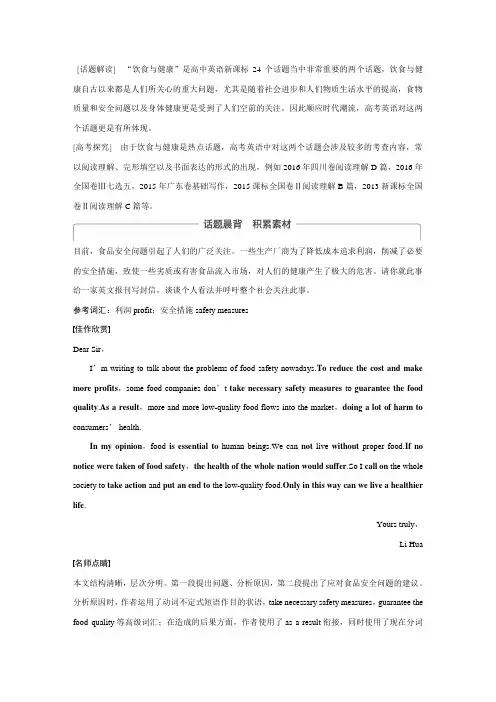
[话题解读]“饮食与健康”是高中英语新课标24个话题当中非常重要的两个话题,饮食与健康自古以来都是人们所关心的重大问题,尤其是随着社会进步和人们物质生活水平的提高,食物质量和安全问题以及身体健康更是受到了人们空前的关注,因此顺应时代潮流,高考英语对这两个话题更是有所体现。
[高考探究]由于饮食与健康是热点话题,高考英语中对这两个话题会涉及较多的考查内容,常以阅读理解、完形填空以及书面表达的形式的出现,例如2016年四川卷阅读理解D篇,2016年全国卷Ⅲ七选五,2015年广东卷基础写作,2015课标全国卷Ⅱ阅读理解B篇,2013新课标全国卷Ⅱ阅读理解C篇等。
目前,食品安全问题引起了人们的广泛关注。
一些生产厂商为了降低成本追求利润,削减了必要的安全措施,致使一些劣质或有害食品流入市场,对人们的健康产生了极大的危害。
请你就此事给一家英文报刊写封信,谈谈个人看法并呼吁整个社会关注此事。
参考词汇:利润profit;安全措施safety measures佳作欣赏Dear Sir,I’m writing to talk about the problems of food safety nowadays.To reduce the cost and make more profits,some food companies don’t take necessary safety measures to guarantee the food quality.As a result,more and more low-quality food flows into the market,doing a lot of harm to consumers’ health.In my opinion,food is essential to human beings.We can not live without proper food.If no notice were taken of food safety,the health of the whole nation would suffer.So I call on the whole society to take action and put an end to the low-quality food.Only in this way can we live a healthier life.Yours truly,Li Hua 名师点睛本文结构清晰,层次分明。
2018年高考英语一轮复习Unit 3 Ahealthy life话题新人教版选修6编辑整理:尊敬的读者朋友们:这里是精品文档编辑中心,本文档内容是由我和我的同事精心编辑整理后发布的,发布之前我们对文中内容进行仔细校对,但是难免会有疏漏的地方,但是任然希望(2018年高考英语一轮复习 Uni t 3 A healthy life话题新人教版选修6)的内容能够给您的工作和学习带来便利。
同时也真诚的希望收到您的建议和反馈,这将是我们进步的源泉,前进的动力。
本文可编辑可修改,如果觉得对您有帮助请收藏以便随时查阅,最后祝您生活愉快业绩进步,以下为2018年高考英语一轮复习 Unit 3 A healthy life话题新人教版选修6的全部内容。
Unit 3 A healthy lifeThe Best Nourishment of Life 生命最好的养料Alittle boy almost thought of himself as the most unfortunate childin theworld because poliomyelitis made his leg lame and h is teeth uneven and protrudent. He seldom played with his classmates;and when theteacher asked him to answerquestions,he alwayslowered his head without a word.一个小男孩几乎认为自己是世界上最不幸的孩子,因为小儿麻痹症使他腿脚行动不便,牙齿参差不齐.他很少跟同学们玩耍,老师叫他回答问题时,他也总是低着头一言不发。
One spring, the boy’s father asked for some saplings from the neighbo r。
第 - 1 - 页话题自然NatureClass:Name:Group:No:Learning Objectives:1.Review the important words and expressions in the reading material:2. Learn the reading skills: scanning and skimmingLearning Key Points:1.Grasp the important words and expressions in the reading material2.Master the reading skills: scanning and skimmingLearning Difficult Points:Improve the reading ability Learning Procedures:I.【Pre-class homework】Assessment:Read the passage and choose the best ans wer (1)Life in the ClearTransparent animals let light pass through their bodies the same way light passes through a window. These animals typically live between the surface of the ocean and a depth of about 3,300 feet—as far as most light can reach. Most of them are extremely delicate and can be damaged by a simple touch. Sonke Johnsen, a scientist in biology, says, “These animals live through their life alone. They never touch anything unless they're eating it, or unless somethingis eating them.”And they are as clear as glass. How does an animal become see-through?It's trickier than you might think.The objects around you are visible because they interact with light.Light typically travels in a straight line. But some materials slow and scatter(散射) light, bouncing it away from its original path. Others absorb light, stopping it dead in its tracks. Both scattering and absorption make an object look different from other objects around it, so you can see it easily.But a transparent object doesn't absorb or scatter light, at least not very much, Light can pass through it without bending or stopping. That means a transparent object doesn't look very different from the surrounding air or water. You don't see it ----you see the things behind it.To become transparent, an animal needs to keep its body from absorbing or scattering light. Living materials can stop light because they contain pigments(色素) that absorb specific colors of light. But a transparent animal doesn't have pigments, so its tissues won't absorb light. According to Johnsen, avoiding absorption is actually easy. The real challenge is preventing light from scattering.Animals are built of many different materials----skin, fat, and more----and light moves through each at a different speed. Every time light moves into a material with a new speed, it bends and scatters. Transparent animals use different tricks to fight scattering. Some animals are simply very small or extremely flat. Without much tissue to scatter light, it is easier to be see—through. Others build a large, clear mass of non-living jelly-lie(果冻状的)material and spread themselves over it .Larger transparent animals have the biggest challenge, because they have to make all the different tissues in their bodies slow down light exactly as much as water does. They need to look uniform. But how they're doing it is still unknown. One thing is clear for these larger animals, staying transparent is an active process. When they die, they turn a non-transparent milky white.(NMET2019北京卷C篇)63. According to Paragraph 1, transparent animals_______.A. stay in groupsB. can be easily damagedC. appear only in deep oceanD. are beautiful creatures64. The underlined word “dead”in Paragraph 3 means__________. A. silently B. gradually C. regularly D. completely65. One way for an animal to become transparent is to ________.A. change the direction of light travelB. gather materials to scatter light.C. avoid the absorption of lightD. grow bigger to stop light.66. The last paragraph tells us that larger transparent animals________.A. move more slowly in deep waterB. stay see-through even after deathC. produce more tissues for their survivalD. take effective action to reduce light spreading(2)Their cheery song brightens many a winter's day. But robins are in danger of wearing themselves out by singing too much. Robins are singing all night一as well as during the day, British-based researchers say.David Dominoni, of Glasgow University, said that light from street lamps, take away signs and homes is affecting the birds' biological clock, leading to them being wide awake when they should be asleep.Dr Dominoni, who is putting cameras inside nesting boxes to track sleeping patterns, said lack of sleep could put the birds' health at risk. His study shows that when robins are exposed to light at night in the lab, it leads to some genes being active at the wrong time of day. And the more birds are exposed to light, the more active they are at night.He told people at a conference, There have been a couple of studies suggesting they are increasing their song output at night and during the day they are still singing. Singing is a costly behavior and it takes energy. So by increasing their song output, there might be some costs of energy.And it is not just robins that are being kept awake by artificial light.第 - 3 - 页Blackbirds and seagulls are also being more nocturnal. Dr Dominoni said, In Glasgow where I live, gulls are a serious problem. I have people coming to me saying `You are the bird expert. Can you help us kill these gulls?'.During the breeding(繁殖)season, between April and June, they are very active at night and very noisy and people can't sleep.Although Dr Dominoni has only studied light pollution, other research concluded that robins living in noisy cities have started to sing at night to make them heard over loud noise.However, some birds thrive(兴旺)in noisy environments. A study from California Polytechnic University found more hummingbirds in areas with heavy industrial machinery. It is thought that they are capitalising on their predators(天敌)fleeing to quieter areas.(NMET2019四川卷D篇)42. According to Dr Dominoni's study, what cause robins to sing so much?A. The breeding season.B. The light in modemC. The dangerous environment.D. The noise from heavy machinery.43. What is the researchers' concern over the increase of birds' song output?A. The environment might be polluted.B. The birds' health might be damaged.C. The industry cost might be increased.D. The people's hearing might be affected.44. What does the underlined word nocturnal in Paragraph 5 mean?A. Active at night.B. Inactive at night.C. Active during the day.D. Inactive during the day.45. Why do some birds thrive in noisy environments?A. Because there are fewer dangers.B. Because there is more food to eat.C. Because there is less light pollutionD. Because there are more places to take shelterII.【While-class】Assessment:Step1. Lead-inStep2. Group discussion and presentationStep3.Consolidation: Read the following passage and choose the best answer(1)California Condor's Shocking RecoveryCalifornia condors are North America's largest birds, with wind-length of up to 3 meters. In the 1980s, electrical lines an d lead poisoning (铅中毒) nearly drove them to dying out. Now, electric shocktraining and medical treatment are helping to rescue these big birds.In the late 1980s, the last few condors were taken from the wild, and there are now more than 150 flying over California and nearby Arizona, Utah and Bajain Mexico.Electrical lines have been killing them off. “As they go in to rest for the night, they just don't see the power lines,”says Bruce Rideout of San Diego Zoo. Their wings can bridge the gap between lines, resulting in electrocution (电死) if they touch two lines at once.So scientists have come up with a shocking idea. Tall poles, placed in large training areas, teach the birds to stay clear of electrical lines by giving them a painful but undeadly electric shock. Before the training was introduced, 66% of set-freed condors died of electrocution. This has now dropped to 18%.Lead poisonous has proved more difficult to deal with. When condors eat dead bodies of other animals containing lead, they absorb large quantities of lead. This affects their nervous systems and ability to produce baby birds, and can lead to kidney(肾) failures and death. So condors with high levels of leadare sent to Los Angeles Zoo, where they are treated with calcium EDTA, a chemical that removes lead from the blood over several days. This work is starting to pay off. The annual death rate for adult condors has dropped from 38% in 2019 to 5.4% in 2019.Rideout's team thinks that the California condors' average survival time in the wild is now just under eight years. “Although these measures are not effective forever, they are vital for now,”he says. “They are truly good birds that are worth every effort we put into recovering them.”(NMET 2019 北京) 63. California condors attract researchers' interest because they. A. are active at night第 - 5 - 页 B. had to be bred in the wild C. are found on in CaliforniaD. almost died out in the 1980s64. Researchers have found electrical lines are .A. blocking condors' journey homeB. big killers of California condorsC. rest places for condors at nightD. used to keep condors away65. According to Paragraph 5, lead poisoning .A. makes condors too nervous to flyB. has little effect on condors' kidneysC. can hardly be gotten rid of form condors' bloodD. makes it different for condors to produce baby birds66. The passage shows that .A. the average survival time of condors is satisfactoryB. Rideout's research interest lies in electric engineeringC. the efforts to protect condors have brought good resultsD. researchers have found the final answers to the problem(2)Chimps (黑猩猩) will cooperate in certain ways, like gathering in war partiesto protect their territory. But beyond the minimum requirements as social beings, they have little instinct (本能) to help one another. Chimps in the wild seek food for themselves. Even chimp mothers regularly decline to share food with their children. Who are able from a young age to gather their own food?In the laboratory, chimps don't naturally share food either. If a chimp is put in acage where he can pull in one plate of food for himself or, with no great effort, a plate that also provides food for a neighbor to the next cage, he will pull at random ---he just doesn't care whether his neighbor gets fed or not. Chimps are truly selfish.Human children, on the other hand are extremely corporative. From the earliest ages, they decide to help others, to share information and to participate achieving common goals. The psychologist Michael Tomasello has studied this cooperativeness in a series of expensive with very young children. He finds that ifbabies aged 18 months see a worried adult with hands full trying to open a door, almost all will immediately try to help.There are several reasons to believe that the urges to help, inform and share are not taught .but naturally possessed in young children. One is that these instincts appear at a very young age before most parents have started to train children to behave socially. Another is that the helping behaviors are not improved if the children are rewarded. A third reason is that social intelligence. Develops in children before their general cognitive(认知的)skills, at least when compared with chimps..In tests conducted by Tomtasell, the children did no better than the chimps on the physical world tests, but were considerably better at understanding the social world. The cure of what children's minds have and chimps' don't in what Tomasello calls what. Part of this ability is that they can infer what others know or are thinking. But that, even very young children want to be part of a shared purpose. They actively seek to be part of a “we”, a group that intends to work toward a shared goal. (NMET 2019江苏)58. What can we learn from the experiment with chimps?A. Chimps seldom care about others' interests.B. Chimps tend to provide food for their children.C. Chimps like to take in their neighbors' food.D. Chimps naturally share food with each other.59. Michael Tomasello's tests on young children indicate that they____.A. have the instinct to help othersB. know how to offer help to adultsC. know the world better than chimpsD. trust adults with their hands full60. The passage is mainly about ____.A. the helping behaviors of young childrenB. ways to train children's shared intentionalityC. cooperation as a distinctive human natureD. the development of intelligence in childrenStep4.PresentationStep5.Summary第 - 7 - 页III.【Post-class】Self- reflectionI enjoyed learning aboutI found these words usefulI found these expressions useful:I have learned aboutSome examples:Keys:Suggested Answers:I. Pre-class homework63. B 64. D 65. C 66. D42.B 43.B 44.A 45.AII. While-class (课堂教学流程)63. D 64. B 65. D 66. C 58. A 59. A 60. C。
高三英语健康保健类阅读试题答案及解析1. "Can I get a light?" This question is among the most common between smokers. What if this question was to come from an unusual source? In April 2014, the National Health Promotion Foundation uploaded an anti-smoking advertisement onto YouTube. The anti-smoking ad has quickly been known as the "most powerful anti-smoking ad."The anti-smoking video, called the "Smoking Kid," features children walking up to adult smokers asking for a light. The children in the ad are actors but the adults smoking are unsuspecting participants in the project.The video begins with the statement "adults know that smoking is harmful, but don’t remind themselves of this fact " Once a "smoking kid" approaches the adults, every adult asked is shocked that a child with a cigarette in hand is asking for a light. The first adult starts by saying, "I’m not giving it to you," and the video goes on to state "every adult filmed said no and reminded the children that smoking is bad."Before going away, the kid hands each adult a booklet after being turned down for a light. The booklet says, "You worry about me, but why not about yourself?" Each adult looks around for the child as their faces are filled with confusion and discomfort.The video shows that a few of the smokers quickly threw away their cigarettes or put their cigarettes away, showing that this experiment was affective at that moment.The most influential element in the ad isn't the use of children or the responses from the smoking adults. It comes down to something much simpler than that. Why is it that we worry about other people, forgetting to worry about ourselves?【1】 According to the text, the anti-smoking ad is ______.A.unusual B.shocking C.influential D.encouraging【答案】C【解析】C【试题解析】推理题。
[话题解读]“饮食与健康”是高中英语新课标24个话题当中非常重要的两个话题,饮食与健康自古以来都是人们所关心的重大问题,尤其是随着社会进步和人们物质生活水平的提高,食物质量和安全问题以及身体健康更是受到了人们空前的关注,因此顺应时代潮流,高考英语对这两个话题更是有所体现。
[高考探究]由于饮食与健康是热点话题,高考英语中对这两个话题会涉及较多的考查内容,常以阅读理解、完形填空以及书面表达的形式的出现,例如2016年四川卷阅读理解D篇,2016年全国卷Ⅲ七选五,2015年广东卷基础写作,2015课标全国卷Ⅱ阅读理解B篇,2013新课标全国卷Ⅱ阅读理解C篇等。
目前,食品安全问题引起了人们的广泛关注。
一些生产厂商为了降低成本追求利润,削减了必要的安全措施,致使一些劣质或有害食品流入市场,对人们的健康产生了极大的危害。
请你就此事给一家英文报刊写封信,谈谈个人看法并呼吁整个社会关注此事。
参考词汇:利润profit;安全措施safety measures佳作欣赏Dear Sir,I’m writing to talk about the problems of food safety nowadays.To reduce the cost and make more profits,some food companies don’t take necessary safety measures to guarantee the food quality.As a result,more and more low-quality food flows into the market,doing a lot of harm to consumers’ health.In my opinion,food is essential to human beings.We can not live without proper food.If no notice were taken of food safety,the health of the whole nation would suffer.So I call on the whole society to take action and put an end to the low-quality food.Only in this way can we live a healthier life.Yours truly,Li Hua 名师点睛本文结构清晰,层次分明。
Topic HealthReadingClass:Name:Group:No:Learning Objectives:1.Review the important words and expressions in the reading material:2. Learn the reading skills: scanning and skimmingLearning Key Points:1.Grasp the important words and expressions in the reading material2.Master the reading skills: scanning and skimmingLearning Difficult Points:Improve the reading abilityLearning Procedures:I.【Pre-class homework】Read the passage and choose th e best answer(1)We‟ve reached a strange—some would say unusual—point. While fighting world hunger continues to be the matter of vital importance according to a recent report from the World Health Organization (WHO), more people now die from being overweight, or say, from being extremely fat, than from being underweight. It‟s the good life that‟s more likely to kill us these days.Worse, nearly l8 million children under the age of five around the world are estimated to be overweight. What‟s going on?We really don‟t have many excuses for our weight problems. The dangers of the problem have been drilled into us by public-health campaigns since 2001 and the message is getting through—up to a point.In the 1970s, Finland, for example, h ad the highest rate of heart disease in the world and being overweight was its main cause. Not anymore. A public-health campaign has greatly reduced the number of heart disease deaths by 80 per cent over the past three decades.Maybe that explains why the percentage of people in Finland takingdiet pills doubled between 2001 and 2005, and doctors even offer surgery of removing fat inside and change the shape of the body. That has become a sort of fashion. No wonder it ranks as the world‟s most body-conscious country.We know what we should be doing to lose weight—but actually doing it is another matter. By far the most popular excuse is not taking enough exercise. More than half of us admit we lack willpower.Others blame good food. They say: it‟s just too i nviting and it makes them overeat. Still others lay the blame on the Americans, complaining that pounds have piled on thanks to eating too much American-style fast food.Some also blame their parents—their genes. But unfortunately, the parents are wronged because they‟re normal in shape, or rather slim.It‟s a similar story around the world, although people are relatively unlikely to have tried to lose weight. Parents are eager to see their kids shape up. Do as I say—not as I do. (NMET 2013湖北)59. What is the “strange” point mentioned in the first sentenc e?A. The good life is a greater risk than the bad life.B. Starvation is taking more people‟s lives in the world.C. WHO report shows people‟s unawareness of food safety.D. Overweight issue remains unresolved despite WHO‟s efforts.60. Why does the author think that people have no excuse for being overweight?A. A lot of effective diet pills are available.B. Body image has nothing to do with good food.C. They have been made fully aware of its dangers.D. There are too many overweight people in the world.61. The example of Finland is used to illustrate ______.A. the cause of heart diseaseB. the fashion of body shapingC. the effectiveness of a campaignD. the history of a body-conscious country62. Which would be the best title for the passage?A. Actions or Excuses?B. Overweight or Underweight?C. WHO in a DilemmaD. No Longer Dying of Hunger(2)The morning had been a disaster. My tooth was aching, and I‟d been in an argument with a friend. Her words still hurt: “The troub le with you is that you won‟t put yourself in my place. Can‟t you see things from my point of view?” I shook my head stubbornly—and felt the ache in my tooth. I‟d thought I could hold out till my dentist came back from holiday, but the pain was really unbe arable. I started calling the dentists in the phone book, but no one could see me immediately. Finally, at about lunchtime, I got lucky.“If you come by right now,” the receptionist said, “the dentist will fit you in.”I took my purse and keys and rushed t o my car. But suddenly I began to doubt about the dentist. What kind of dentist would be so eager to treat someone at such short notice? Why wasn‟t he as busy as the others?In the dentist‟s office, I sat down and looked around. I saw nothing but the bare walls and I became even more worried. The assistant noticed my nervousness and placed her warm hand over my ice-cold one.When I told my fears, she laughed and said, …Don‟t worry. The dentist is very good.”“How long do I have to wait for him?” I asked imp atiently.“Come on, he is coming. Just lie down and relax. And enjoy the artwork,” the assistant said.“The artwork?” I was puzzled.The chair went back. Suddenly I smiled. There was a beautiful picture, right where I could enjoy it: on the ceiling. How co nsiderate the dentist was! At that moment, I began to understand what my friend meant by her words. What a relief!(NMET2013 重庆)56. Which of the following best describes the author‟s feeling that morning?A. Cheerful.B. Nervous.C. Satisfied.D. Upset.57. What made the author begin to doubt about the dentist?A. The dentist‟s agreeing to treat her at very short notice.B. The dentist‟s being as busy as the other dentists.C. The surroundings of the dentist‟s office.D. The laughing assistant of the dent ist.58. Why did the author suddenly smile?A. Because the dentist came at last.B. Because she saw a picture on teh ceiling.C. Because she could relax in the chair.D. Because the assistant kept comforting her.59. What did the author learn from her expe rience most probably?A. Strike while the iron is hot.B. Have a good word for one‟s friend.C. Put oneself in other‟s shoes.D. A friend in need is a friend indeed.II.【While-class】Step1. Lead-inStep2. Group discussion and presentationStep3.Consolidation: Read the following passage and choose the best answer(1)Fear may be felt in the heart as well as in the head, according to a study that has found a link between the cycles of a beating heart and the chance of someone feeling fear.Tests on healthy volunteers found that they were more likely to feela sense of fear at the moment when their hearts are contracting(收缩)and pumping blood around their bodies, compared with the point when the heartbeat is relaxed. Scientists s ay the results suggested that the heart is able to influence how the brain responds to a fearful event, depending on which point it is at in its regular cycle of contraction and relaxation.Sarah Garfinkel at the Brighton and Sussex Medical School said, “O ur study show for the first time that the way in which we deal with fear is different depending on when we see fearful pictures in relation to our heart.The study tested 20 healthy volunteers on their reactions to fear as they were shown pictures of fearf ul faces. Dr. Garfinkel said, “The study showed that fearful faces are better noticed when the heart is pumping than when it is relaxed. Thus our hearts can also affect what we see and what we don‟t see—and guide whether we see fear.”To further understand this relationship, the scientists also used a brain scanner(扫描仪)to show how the brain influences the way the heart changes a person‟s feeling of fear.“We have found an important mechanism by which the heart and brain …speak‟ to each other to change our f eelings and reduce fear” Dr. Garfinkel said.“We hope that by increasing our understanding about how fear is dealt with and ways that it could be reduced, we may be able to develop more successful treatments for anxiety disorders, and also for those who ma y be suffering from serious stress disorder.”(NMET 2013 四川)47. What is the finding of the study?A. One‟s heart affects how he feels fear.B. Fear is a result of one‟s relaxed heartbeat.C. Fear has something to do with one‟s health.D. One‟s fast heartbeats are likely to cause fear.48. The study was carried out by analyzing ________.A. volunteers‟ heartbeats when they saw terrible picturesB. the time volunteers saw fearful pictures and their healthconditionsC. volunteers‟ reactions to horrible pictures and data from theirbrain scansD. different pictures shown to volunteers and their heart-braincommunication49. Which of the following is closest in meaning to “mechanism” in Paragraph 6?A. OrderB. SystemC. MachineD. Treatment.50. This study may contribute to ________.A. treating anxiety and stress betterB. explaining the cycle of fear and anxietyC. finding the key to the heart-brain communicationD. understanding different fears in our hearts and heads(2)BLOOD DRIVE &MARROW(骨髓)REGISTRATION“These patients deserve a chance at a normal, happy future and they rely on the kindness of the strangers to make that happen.—Daisy, Isabelle’s Mother Isabelle is the daughter of Daisy and Saman Mirzaei. In January 2008 Isabelle was diagnosed(诊断)with a genetic blood disorder,beta thalassemia. Isabelle‟s body is unable to produce healthy red blood cells. As a result, Isabelle has been receiving blood transfusions (输血) every 4-6weeks since she was 11 months old. A lifetime of regular transfusions can lead to serious medical problems. Her only chance at a normal, healthy life is to have a marrow transplant. Isabelle is an only child, so doctors have started a search for an unrelated marrow donor through The Match Registry. The Mirzaei family asks that y ou consider helping patients like Isabelle by registering to be a marrow donor and give the gift of life, the gift of blood.Held at Wiley HallWednesday, March 26, 2014Behind Heathman Dormitory/Butterfield Rd.12:00 PM - 6 :00 PMDon‟t forget to bring your driver‟s license or another form of identification when you donate.Visit to make an appointment, Sponsor Code 3390.FREE Kingston Pizza ! ! !Marrow Donors:BE THE MATCH ·be 18 to 44 years old·in good health·give a swab(化验标本)of your cheek cells for marrow typing ·FREE—sponsored(赞助)by Michael‟s FundWWW. ribc. org 800-283-8385The Rhode Island Blood Center distributes blood products to hospitals in Rhode Island and Southern New England.(NMET 2014 福建)65. We can learn from the passage that__________.A. the blood drive is organized by Isabelle's motherB. Isabelle receives blood transfusions regularlyC. Isabelle has been ill for 11 monthsD. doctors will sponsor Isabelle's family66. To be a marrow donor, you must_____________.A. be a relative of the patientB. carry a driver's licenseC. be at least 18 years oldD. apply to Michael's Fund67. Those who want to help patients like Isabelle can ___________.A. come to Wiley Hall every WednesdayB. visit www. ribc. org for an appointmentC. contact their parents at 800-283-8385D. call at hospitals in Rhode IslandStep4.PresentationStep5.SummaryIII.【Post-class】Self- reflectionKeys:Suggested Answers:I. Pre-class homework59. A 60. C 61. C 62. A56-59DABCII. While-class (课堂教学流程)47-50ACBA 65. B 66. C 67. B。